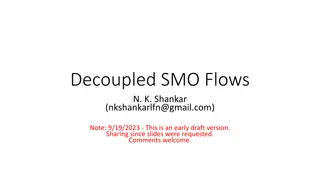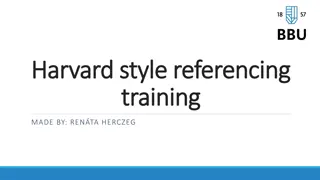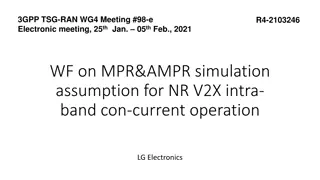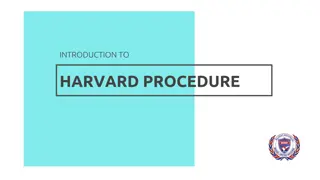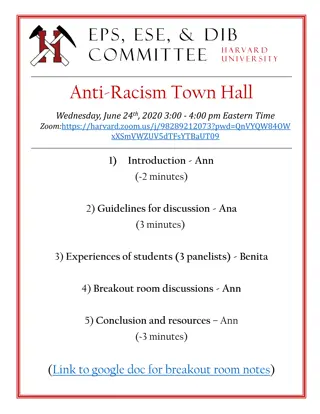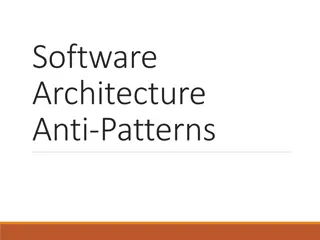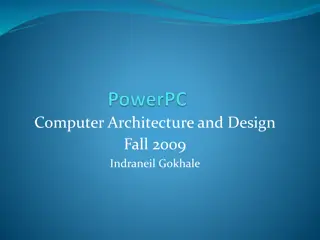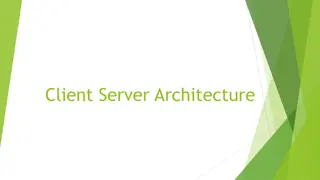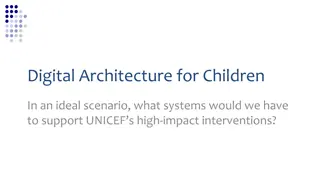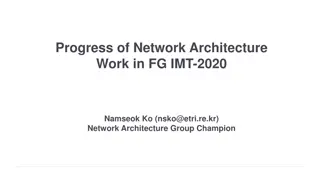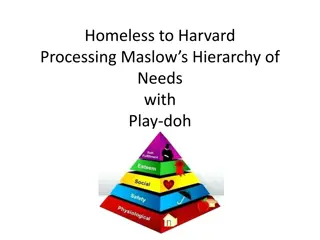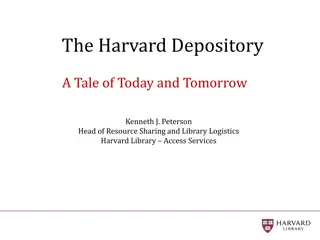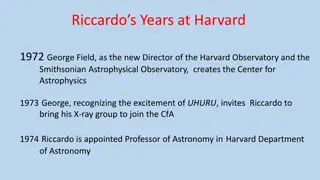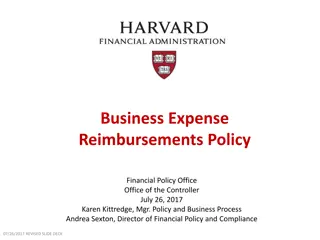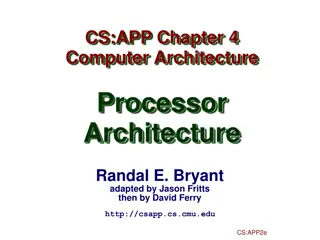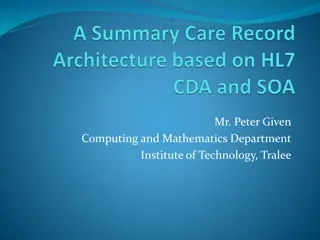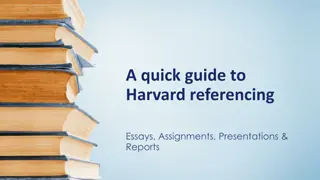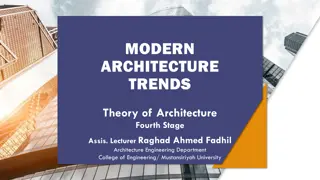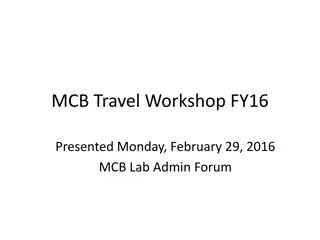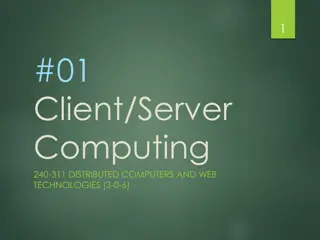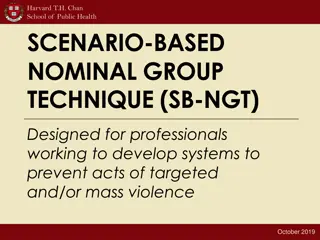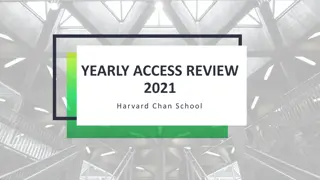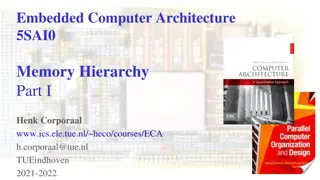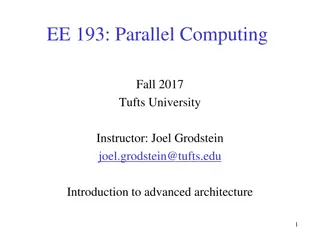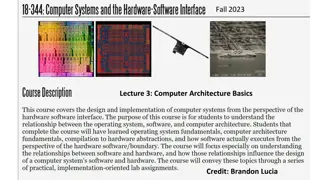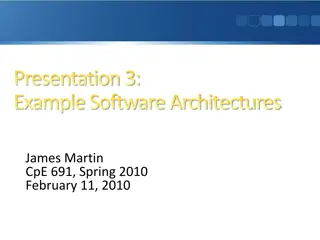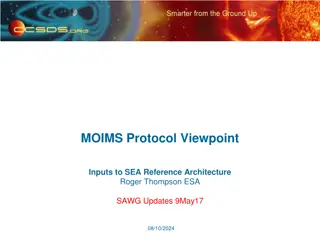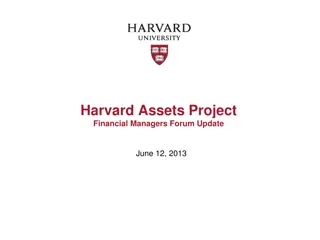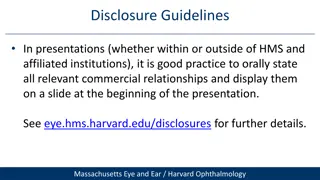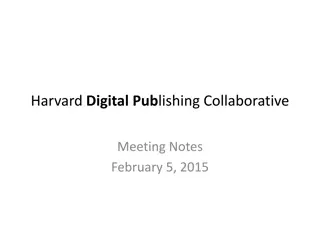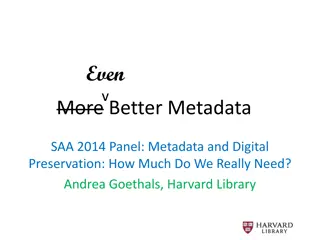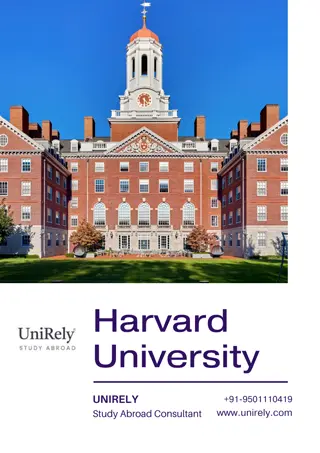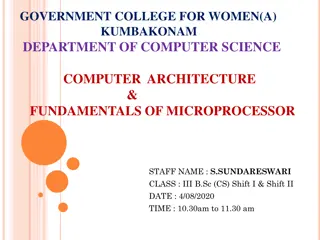Computer Organization and Architecture
A computer system is a programmable digital electronics device that processes data as per program instructions to provide meaningful output. It comprises hardware and software components, with hardware being the physical parts and software essential for driving the hardware. Computer organization fo
16 views • 71 slides
Decoupled SMO Architecture Overview
Develop flows showing interaction between SMO modules in the context of open-source architecture using OSC, ONAP, and other code. The objective is to align open-source work with O-RAN trends, improve synergy, reduce duplication, and provide feedback to O-RAN discussions. Related work includes Decoup
7 views • 27 slides
Harvard Style Referencing and Avoiding Plagiarism
Learn about Harvard referencing style, the importance of avoiding plagiarism, and how to create in-text references properly. Understand the BBU FCHT Harvard system for author-year method referencing and how to cite books and book chapters effectively.
1 views • 24 slides
Overview of RF Architecture and Waveform Assumptions for NR V2X Intra-Band Operation
In the electronic meeting of 3GPP TSG-RAN-WG4, discussions were held on the RF architecture and waveform assumptions for NR V2X intra-band operation in band n79. Various options and recommendations were presented regarding RF architecture, antenna architecture, and waveform definitions for efficient
1 views • 7 slides
Harvard Procedure Guidelines and Rules for Model United Nations
In this guide, you will explore the rules and procedures specific to the Harvard Procedure in Model United Nations. It covers general rules, guidelines on resolutions and voting, language requirements, courtesy expectations, rules of procedure, motions, points of order, and parliamentary inquiries.
6 views • 20 slides
Harvard University Anti-Racism Town Hall Event
Harvard University's EPS, ESE, & DIB Committee is holding an Anti-Racism Town Hall event on June 24th, 2020. The event focuses on providing a platform for discussion, sharing experiences, and promoting awareness of implicit bias. Breakout room discussions and valuable resources for engaging in anti-
0 views • 4 slides
Computer Architecture and Organization
Computer architecture and organization are fundamental aspects of computing systems. Computer architecture focuses on the functional design and implementation of various computer parts, while computer organization deals with how operational attributes come together to realize the architectural speci
3 views • 40 slides
Common Software Architecture Anti-Patterns
Anti-patterns in software architecture are commonly occurring solutions to problems that lead to negative consequences. These arise due to insufficient knowledge or experience, misuse of design patterns, and lack of attention to evolving project architecture. Examples include Jumble, Stovepipe, Spag
3 views • 7 slides
PowerPC Architecture Overview and Evolution
PowerPC is a RISC instruction set architecture developed by IBM in collaboration with Apple and Motorola in the early 1990s. It is based on IBM's POWER architecture, offering both 32-bit and 64-bit processors popular in embedded systems. The architecture emphasizes a reduced set of pipelined instruc
2 views • 13 slides
Client-Server Architecture
Client-server architecture is a computing model where a central server hosts and manages resources and services for client computers over a network. There are different types of clients and servers, each with unique characteristics and roles. This architecture offers various advantages and disadvant
3 views • 15 slides
Streamlining Corporate Giving Processes at Harvard: Challenges and Opportunities
Harvard faces challenges in its historically cautious approach to corporate funding, resulting in outdated processes, stakeholder complexities, and missed opportunities. A working group aims to address these issues with a toolkit and plans for future engagement strategies.
5 views • 8 slides
Digital Architecture for Supporting UNICEF's High-Impact Interventions
In an ideal scenario, the digital architecture for children would encompass systems such as Enterprise Architecture, Functional Architecture, and Solution Architecture to support UNICEF's high-impact interventions. It would involve integrated platforms for Health Information Exchange, Supply Chain M
2 views • 19 slides
Progress of Network Architecture Work in FG IMT-2020
In the Network Architecture Group led by Namseok Ko, significant progress has been made in defining the IMT-2020 architecture. The work has involved gap analysis, draft recommendations, and setting framework and requirements. Phase 1 focused on identifying 19 architectural gaps, such as demands for
2 views • 11 slides
Maslow's Hierarchy of Needs Through "Homeless to Harvard" Play-doh Activity
Explore the story of "Homeless to Harvard" by creating Play-doh examples of how David's needs were met at each level of Maslow's Hierarchy. Use quoted text evidence to explain the fulfillment of physiological, safety, love/belonging, esteem, and self-actualization needs. Follow instructions to photo
0 views • 7 slides
The Harvard Depository: A Modern Library Challenge
The Harvard Depository, once a storage haven for Harvard Library materials, now faces the challenges of modernization and adapting to the future. With an array of facilities and handling millions of items, the facility continues to serve library patrons while navigating new demands and advancements
0 views • 19 slides
Insights from Monthly Harvard-Harris Poll - March 2017
The Monthly Harvard-Harris Poll conducted in March 2017 among 2,092 registered voters in the United States revealed that voters had varied opinions on the country's direction and the state of the economy. While more than 6 in 10 voters considered the US economy to be strong, less than half had a fav
8 views • 50 slides
Proposed Way Forward for Service-Oriented Architecture (SOA) in Space Missions
Proposed establishment of a Working Group by the CESG to develop a Service-Oriented Architecture (SOA) framework for space mission operations within the CCSDS. The focus includes identifying services, use cases, architecture definitions, and business cases to enhance CCSDS-wide interoperability and
0 views • 7 slides
Riccardo's Years at Harvard: Contributions to High-Energy Astrophysics
Explore Riccardo's significant contributions during his years at Harvard University, collaborating with prominent researchers, teaching courses in high-energy astrophysics, and engaging in influential faculty meetings. His work led to groundbreaking discoveries and advancements in the field.
0 views • 8 slides
Harvard University Business Expense Reimbursements Policy Overview
Harvard University's business expense reimbursements policy ensures compliance with IRS rules by requiring expenses to be substantially business-related, documented with receipts, and submitted timely. Expenses must be ordinary, necessary, and business-related to qualify for tax-free reimbursement.
0 views • 17 slides
Introduction to Y86 Instruction Set Architecture
Y86 Instruction Set Architecture is a simplified pseudo-language based on x86 (IA-32) architecture. It involves implementing the Fetch-Decode-Execute cycle, where instructions are fetched from memory, decoded, and executed. The Y86 ISA offers a simpler set of instructions and formats compared to x86
0 views • 25 slides
Enhancing Healthcare Data Sharing with Service-Oriented Architectures
This paper explores how Service-Oriented Architectures (SOA) can be integrated with the HL7 Clinical Document Architecture to facilitate the sharing of Summary Care Records between healthcare information systems. It highlights the benefits of a federated architecture based on SOA and coding standard
0 views • 51 slides
Harvard Forest Schoolyard Ecology Data Analysis Workshop 2016
Compilation of teacher-developed graphs and data documents from the Harvard Forest Schoolyard Ecology Workshop 2016. The documents include comparisons of tree species by plot, number of tree species, carbon biomass, and biomass distribution across different species and plots. Additionally, the analy
0 views • 22 slides
Mastering Harvard Referencing for Academic Writing
Learn the essentials of Harvard referencing for academic writing, including in-text citations and reference lists. Understand the difference between a bibliography and reference list, and discover how to create a hanging indent in Word for your citations.
0 views • 35 slides
Modern Architecture Trends: Expressionism and Bauhaus Movement
Delve into the world of modern architecture trends, focusing on Expressionist architecture in Europe during the early 20th century and the influential Bauhaus movement in Germany. Expressionist architecture emphasized emotional effects through distorted forms inspired by nature, while the Bauhaus sc
0 views • 10 slides
MCB Travel Workshop FY16: Policies and Guidelines Review
In the MCB Travel Workshop FY16, significant travel policy developments, sponsored expenditures guidelines, and updates to Harvard's Travel Policy were discussed. The workshop covered components of a business description, including when to include transaction details, who is involved, where it took
0 views • 22 slides
Overview of 5G System Architecture and User Plane Functionality
This content showcases various aspects of 5G system architecture, including system handover, non-roaming architecture, service-based architecture, and user plane functionality. It delves into the control plane functions, user plane functions, and core network endpoints of the 5G network. The images
1 views • 49 slides
Client/Server Computing Architecture
Client/Server Computing architecture separates clients and servers over a network, allowing for file sharing, resource allocation, and service requests. Clients initiate services from servers, with transparent server locations and message-passing transactions. Systems with C/S architecture include f
0 views • 18 slides
Harvard T.H. Chan School of Public Health Scenario-Based Nominal Group Technique (SB-NGT)
The Harvard T.H. Chan School of Public Health utilizes SB-NGT to address targeted and mass violence prevention systems development. This technique involves scenario-based group discussions to collect data, define terminology, and solve challenges related to violence prevention. Various examples and
0 views • 16 slides
Harvard Chan School 2021 Yearly Access Review Process
The Harvard Chan School conducts its annual Yearly Access Review (YAR) process to review user access to various financial systems. The process involves assessing permissions, levels of access, and organizational details for each team member. Instructions are provided on reviewing worksheets, adding
0 views • 19 slides
Memory Hierarchy and Different Computer Architecture Styles
Delve into the concepts of memory hierarchy, cache optimizations, RISC architecture, and other architecture styles in embedded computer architecture. Learn about Accumulator and Stack architectures, their characteristics, advantages, and example code implementations. Explore the differences between
2 views • 52 slides
Advanced Computer Architecture in Parallel Computing
Covering topics like Instruction-Set Architecture (ISA), 5-stage pipeline, and Pipelined instructions, this course delves into the intricacies of advanced computer architecture, with a focus on achieving high performance by optimizing data flow to execution units. The course provides insights into t
0 views • 12 slides
Computer Architecture Basics: Recap of Key Concepts and Optimization Strategies
The lecture delved into hardware/software trade-offs, von Neumann vs. Harvard architecture differences, and explored the Von Neumann Computing Model. It also covered optimizing Harvard architecture, code restructuring for efficient execution, and discussed Amdahl's Law in relation to execution time
0 views • 66 slides
Software Architecture Design for Document Filter System: A Case Study
This presentation delves into the software architecture design and implementation of a Document Filter System (DFS) aimed at efficiently finding relevant information. It discusses the architecture's effectiveness in supporting diverse applications, multilingual document searching, complex query func
0 views • 33 slides
MOIMS Protocol Viewpoint for SEA Reference Architecture Updates
This content describes the MOIMS Protocol Viewpoint inputs to the SEA Reference Architecture updates by Roger Thompson from ESA SAWG. It includes details about the graphical conventions, data store elements, organizational domains, network layers, communications protocols, and space communications c
0 views • 21 slides
Harvard Assets Project Update and Risk Assessment
The Harvard Assets Project provides insights on the financial managers forum update, high-level project timeline, status of current activities, and project risk approach. The project is progressing through various phases with detailed planning and analysis. Governance meetings, stakeholder analysis,
0 views • 14 slides
Guidelines for Commercial Disclosure in Presentations
It is essential to disclose all relevant commercial relationships orally and visually at the beginning of presentations, whether within or outside Harvard Medical School and affiliated institutions. This includes stating any financial ties, research funding, consultancy roles, shareholdings, and boa
0 views • 4 slides
Harvard Digital Publishing Collaborative Meeting Summary
The Harvard Digital Publishing Collaborative is a community dedicated to digital publishing, focusing on content creation, production, security, and delivery. The group explores tools, platforms, workflows, security models, and delivery channels. The recent meeting discussed production and distribut
0 views • 5 slides
Evaluating Metadata Quality for Digital Preservation at Harvard Library
Explore the importance of metadata quality in digital preservation with insights from Harvard Library's experience managing their Digital Repository Service. Discover challenges faced with user-contributed metadata and the necessity for systematic validation and tracking to ensure accurate preservat
0 views • 17 slides
Harvard University
\"Harvard is a popular name amongst the study abroad aspirants. If you\u2019re among the aspirants and don\u2019t know how to apply to Harvard University, we\u2019ve got your back. Our expert team works at their best frequency to provide you with val
0 views • 4 slides
Computer Architecture & Fundamentals of Microprocessor at Government College for Women
Department of Computer Science at Government College for Women in Kumbakonam offers a course on Computer Architecture & Fundamentals of Microprocessor. The course covers topics such as Von Neumann and Harvard Architectures, fixed-program computers, stored-program computers, and the differences betwe
0 views • 23 slides

